Allahumma Inni Zalamtu Nafsi Meaning, Transliteration, and Arabic
Advertisements
Allahumma Inni zalamtu nafsi is from among the powerful Duas For Forgiveness. It involves acknowledgment of the ultimate shortcoming, and seeking the ultimate blessings, for forgiveness covers up and erases sins, and mercy delivers good deeds.
Allahumma Inni Zalamtu Nafsi Full Dua In English
Allahumma Inni Zalamtu means O Allah! I have considerably wronged myself. There is none to forgive the sins but You. So grant me pardon and have mercy on me. You are the Most Forgiving, the Most Compassionate.
Allahumma Inni Zalamtu In Arabic
Here is how to write write allahumma inni zalamtu nafsi in Arabic Text.
اللَّهُمَّ إِنِّي ظَلَمْتُ نَفْسِي ظُلْمًا كَثِيرًا، وَلَا يَغْفِرُ الذُّنُوبَ إِلَّا أَنْتَ. فَاغْفِرْ لِي مَغْفِرَةً مِنْ عِنْدِكَ، وَارْحَمْنِي إِنَّكَ أَنْتَ الْغَفُورُ الرَّحِيمُ
Transliteration
The dua is transliterated as Allahumma inni zalamtu nafsi zulman kathiran, wa la yaghfirudh-dhunuba ilia Anta, faghfir li maghfiratan min ‘indika, warhamni, innaka Antal-Ghafur-ur-Rahim.
Advertisements
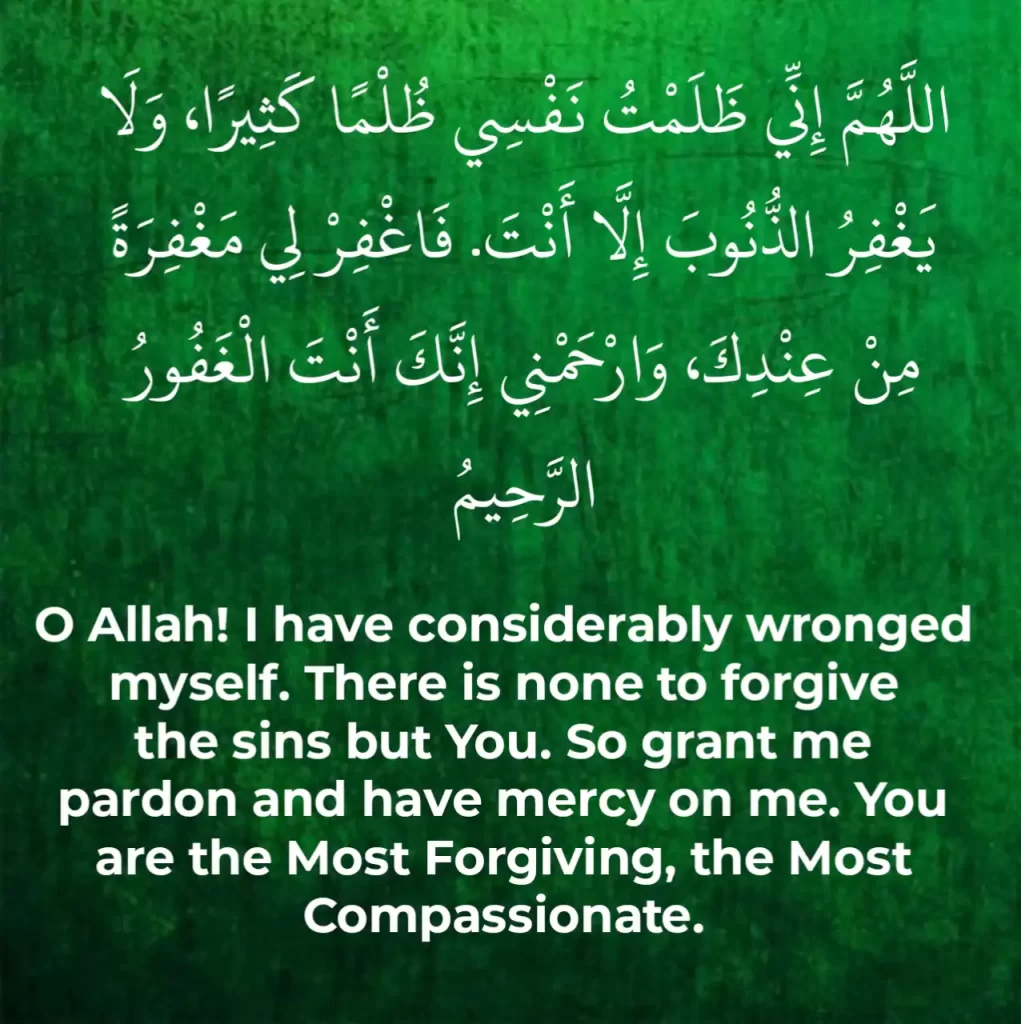
Hadith On Allahumma Inni Zalamtu
Abu Bakr As-Siddiq Radiyallahu Anhu reported: I requested the Messenger of Allah SAW to teach me a supplication which I could recite in my Salat (prayer). Thereupon he said, “Recite: ‘ Allahumma inni zalamtu nafsi zulman kathiran, wa la yaghfirudh-dhunuba ilia Anta, faghfir li maghfiratan min ‘indika, warhamni, innaka Antal-Ghafur-ur-Rahim.
[Al-Bukhari and Muslim]
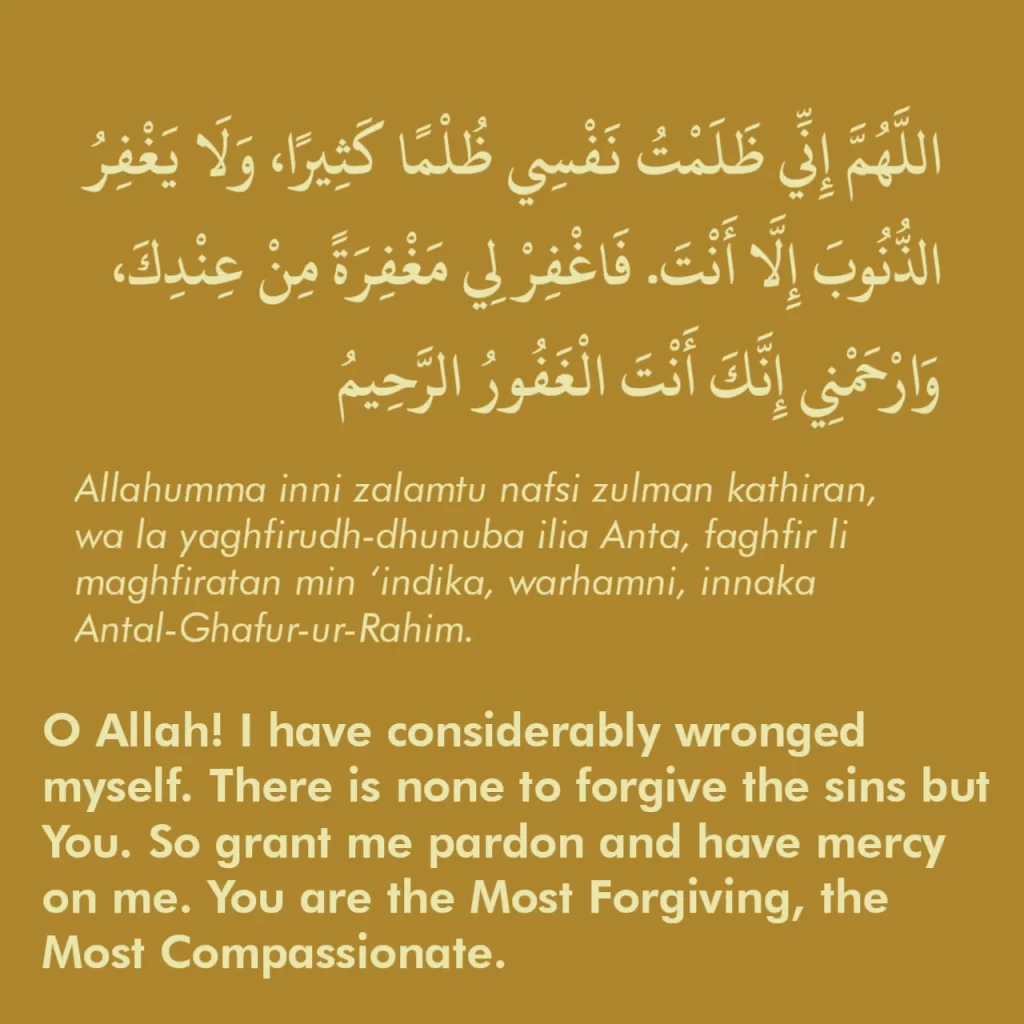
SIMILAR DUAS:
- Allahumma Inni As Alukal Huda
- Allahumma Anta Rabbi La Ilaha Illa Anta
- Allahumma Inna Nasta Inuka Full Dua In English And Arabic.
Commentary
The author of riyadus Saliheen, may Allah shower Blessing on him, cited the hadeeth of Aboo Bakr, may Allah shower blessings on him, that he requested the Prophet SAW for a supplication to recite in his Salat.
Now ponder, who is the enquirer and who is the one being questioned?
The enquirer is Aboo Bakr, may Allah be pleased with him, and he is the most beloved person to the Messenger SAW.
And the one being questioned is the Prophet SAW So, the question is from a beloved to his beloved and as such, there is no doubt that the answer must necessarily be from the best of responses.His saying:
Advertisements
“That I could recite in my Salat” may imply during prostration or after the last Tashhahud.
He replied, say: “Allahumma inni zalamtu nafsi dhulman katheeran wala yaghfiru adh-dhunooba illaa anta faghfir lee maghfiratan min indika warhamnee innakaanta Al-Ghafoor Ar-Raheem.
Meaning: O Allah, I have considerably wronged myself. There is none to forgive the sins but You. So, grant me pardon and have mercy on me. You are the Most-Forgiving and the Most Compassionate.
This is a broad and beneficial supplication.
Allahumma inni zalamtu nafsi dhulman katheeran (O Allah, I have considerably wronged myself).
This is the servant’s acknowledgement of wrongdoing, and it is one of the means of supplication.
That is, a person should mention his condition to his Lord, the Mighty and Sublime, in the midst of supplication as Moosa, alayhis-salaam- did:“
My Lord I am in need of whatever good that you bestow on me”
He sought nearness to Allah with his condition walaayaghfiru adh-dhunooba ilia anta.
Meaning: There is none to forgive the sins but You).
This is praising Allah, the Mighty and Sublime, and confessing his powerlessness and that none can forgive sins beside Allah.
This is as stated by Allah, the Mighty and Sublime:
If the entire mankind were to gather in order to forgive you a single sin, they will not be able to do so because the one who can forgive is Allah – the Mighty and Sublime.
His saying: “ighfir li maghfiratan min indika Meaning So, grant me pardon.
He attached it to Allah because it is more profound and superior for the greatness of the gift is due to the greatness of the Giver.“
Warhamnee meaning have mercy on me with regard to the future and grant me every good.
Innaka anta al-Ghafoor-Raheem means You are the Most-Forgiving and the Most Compassionate.
This is a form of seeking nearness to Allah the Mighty and Sublime – with two related Names.
He had earlier said: “ighfirlee warhamnee” (grant me pardon and have mercy on me) so the appropriate thing is: “Innaka anta al-Ghafoor Ar-Raheem” (You are the Most-Forgiving and the Most Compassionate).
Note
So, one is expected to recite this invocation in his Salat, either during prostration or after the last Tashhahud.
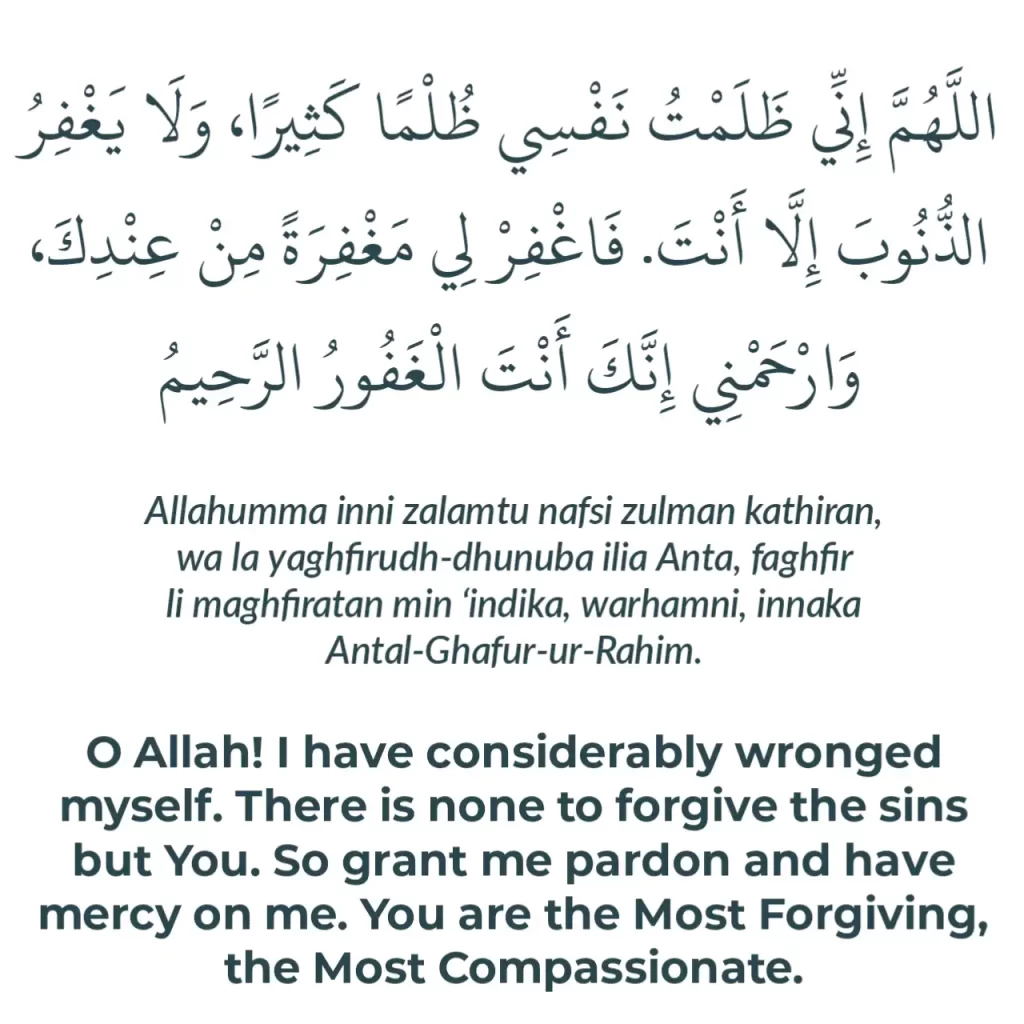
O Allah! I have considerably wronged myself. There is none to forgive the sins but You. So grant me pardon and have mercy on me. You are the Most Forgiving, the Most Compassionate).
I wronged myself: Injustice: putting something out of its place, and it is on levels: the highest of which is polytheism, and under it are major and minor sins.
So forgive me: Al-Ghufrah: covering and taken from Al-Ghafir, and it is that which is placed on the head of the warrior to protect him from beatings, so it is protection and protection.
Al-Ghafoor: One of the great and beautiful names of Allah, and it is one of the buildings of exaggeration. Because he does that to his servants time after time to an infinite number.
The meaning: which increases the concealment of sins for his faithful servants and forgiving them.
Al-Rahim: A name from one of the beautiful [Names of Allah] that indicates the abundance of mercy and compassion for His faithful servants.
This supplication is an indication that the matter of the Hereafter is preferred over the order of the transient world.
This hadith is of great value, and whoever contemplates it and reflects on it, his majesty will appear to him.
Because it involves acknowledgment of the extremes of negligence, acknowledgment of all the of perfection for Allah, asking for forgiveness, and transgression that leads to eternal bliss.
His saying: O Lord, I have wronged myself greatly: This is a confession from the servant to his Lord that he has fallen short in his deeds that necessitates punishment or shortening, and that a person is not stripped of his shortcomings, even if he is honest.
This is a teaching for the supplicant that the state of his supplication should show the utmost humility and submission to his Lord; this is closer to the answer and more rewardig.
His saying: (And no one forgives sins except You): That is, no one is able to cover up sins and transcend them except You alone, for in it is an acknowledgment of the oneness of God Almighty, and seeking forgiveness from Him.
His saying: ((so forgive me a forgiveness from you and have mercy on me)): the denial of ((forgiveness)) indicates that what is required is great forgiveness, the essence of which is not understood, and describing it as being from Him.
The meaning: Grant me a gracious pardon, even if I am not worthy of it by my work. That is why he added it to him ((from you)), for it is greater and more eloquent, for the greatness of giving is from the greatness of the giver.
Allah alone grants success.
Adopted from Explanation of Riyaddus Saliheen by Sheikh Uthaimeen.
Advertisements

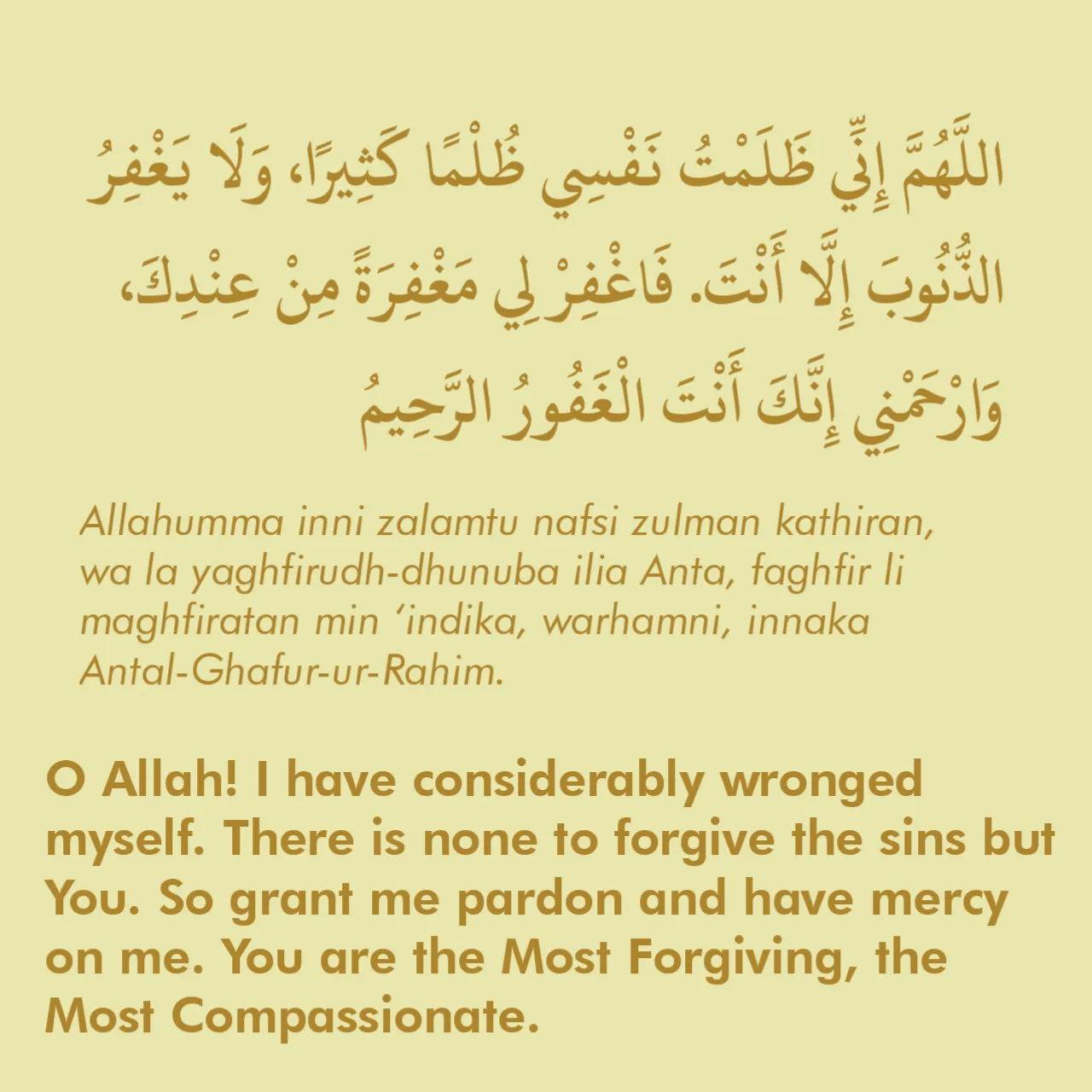
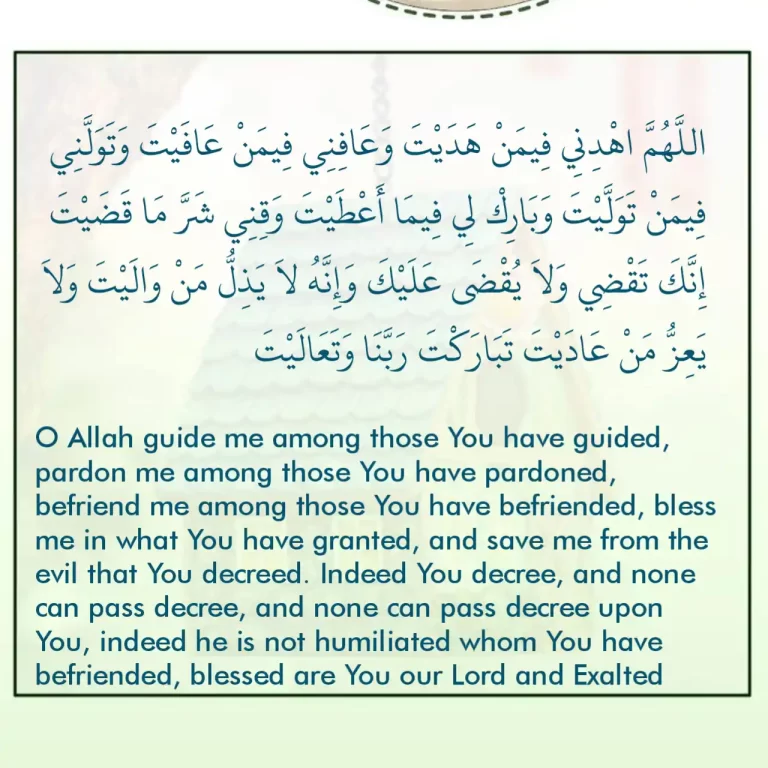

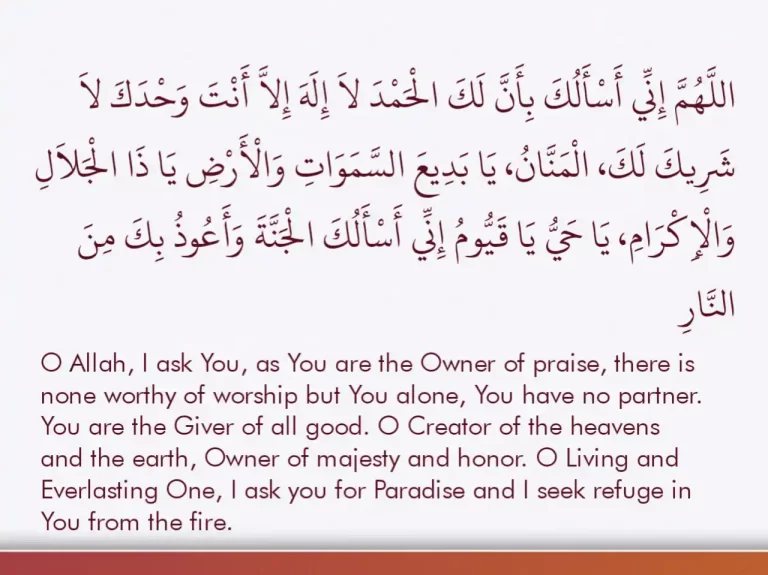


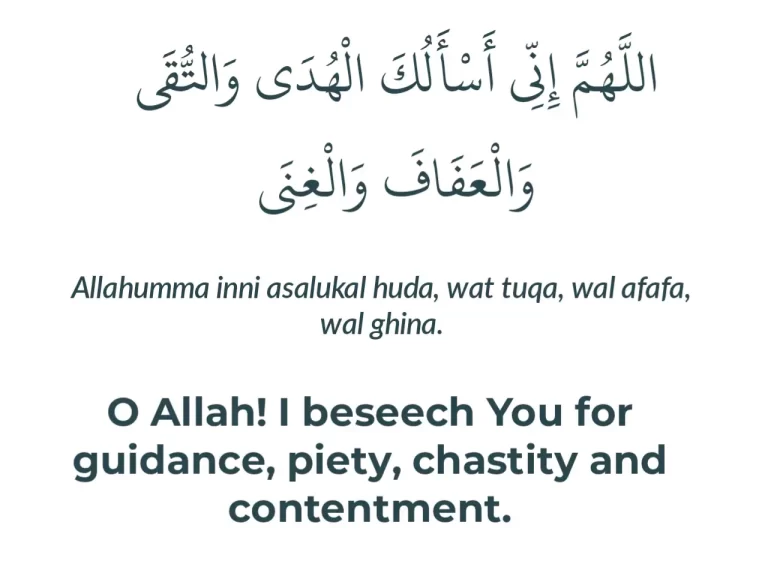
One Comment